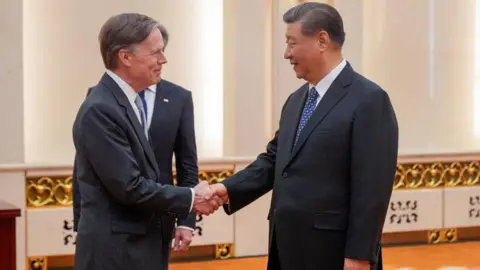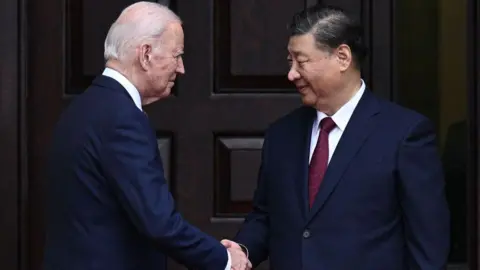By Laura Bicker, China correspondent
Washington and Beijing are talking more regularly to avoid a conflict in the South China Sea despite their “contentious and competitive” relationship, the United States ambassador to China has told the BBC.
“Our militaries are operating in very close proximity to one another in the South China Sea and in the Taiwan Strait. You don’t want to send the wrong signal,” Nicholas Burns said in an interview in Beijing earlier this week.
The South China Sea has become a dangerous flashpoint, where Beijing’s claims are ratcheting up tensions with Taiwan and Philippines, as well as their most powerful ally, the US.
Chinese and Philippine vessels have been playing a dicey cat-and-mouse game in the contested waters in recent months – the latest altercation this week allegedly involved Chinese coastguard personnel boarding a Philippine boat and attacking soldiers with swords and knives.
The US, which has stitched together military alliances from Manila to Tokyo, has repeatedly vowed to defend its allies’ rights in the South China Sea.
This has further strained ties with China – the relationship was already reeling from Russia’s invasion of Ukraine, Chinese claims over self-governed Taiwan and a trade war.
 Reuters
ReutersMr Burns said these were flashpoints that still “completely divided” the two sides, but it was important to try to “get people together” where possible.
“The Chinese have agreed to increase our military-to-military communications and that’s really critical for us. You want to have communication because the last thing we want is an accident, a misunderstanding that leads to conflict,” said the 68-year-old diplomat.
While tensions have eased, the upcoming US presidential election has the potential to disrupt the relationship again.
“We’ve warned the Chinese not to involve themselves in our election in any way, shape or form,” Mr Burns said, adding that the US was “very concerned” about the possibility.
Earlier this year FBI officials said China would likely continue its efforts to sow divisions and could help spread disinformation online.
The ambassador said the FBI also had evidence of “cyber aggression by Chinese authorities” against the US. Beijing has always denied accusations of state-sponsored cyber warfare and says it too is a victim of this type of crime.
Both Joe Biden and Donald Trump are vying to be tough on Beijing, a strategy they see as a vote-winner. In May, President Biden announced a raft of new tariffs on Chinese-made electric cars, solar panels and other goods. Few electric cars reach US shores, but Ambassador Burns denied that domestic politics had played a part in this decision.
He said this was an “economic move” designed to safeguard American jobs. Meanwhile, China has warned it may retaliate with tariffs of its own.
But there are some bright spots despite the rivalry.
Before sitting down for our interview, Mr Burns had a meeting with China’s climate envoy as the world’s two biggest polluters try to find ways to reduce harmful emissions.
Washington and Beijing are also holding what are described as “high-level talks” to prevent the drug fentanyl reaching US shores, which Mr Burns described as “critical”.
 Reuters
ReutersMost of his meetings are at a ministerial level and audiences with President Xi are reserved for when senior US officials, such as Secretary of State Antony Blinken, visit.
Both sides have also vowed to work towards more “people-to-people” exchanges. This comes as the number of US students studying in China has fallen from around 15,000 in 2011 to 800.
Mr Xi hopes to open the door for 50,000 American students to come to China in the next five years. He said on a visit to San Francisco last November that it was the “ultimate wish of our two peoples for exchanges and cooperation”.
But Ambassador Burns accused parts of the Chinese government of not taking these warm words seriously: “Since the San Francisco summit, there have been 61 separate incidents when the security forces or a government ministry have prevented Chinese citizens from participating in public diplomacy programmes at this house, at our embassy or they have prevented people from travelling to the US to participate in joint trips – so it has been very difficult for us to bring people together.”
On the other side, Chinese students and academics have reported being unfairly targeted by US border officials. Beijing’s embassy in Washington lodged a formal protest and accused US authorities of “unwarrantedly” interrogating, harassing, cancelling the visas of and even deporting several students from China with valid travel permits upon their arrival in the US.
Washington has also placed a “level 3” travel advisory on China urging visitors to “reconsider” their travel. Mr Burns denied this alert was contradictory to a US plea to “bring people together,” but was rather a precaution.
“There are Americans imprisoned here who we believe are wrongfully detained, wrongfully prosecuted, I’ve been visiting these prisoners and we want them released.” He said several Americans had been subjected to “exit bans” by China and had their passports taken at the airport and could not leave.
China, in turn, has left the US off a list of countries that are exempt from visas for up to 15 days of travel – Australia is on the list after Beijing recently mended ties with Canberra.
That “people-to-people” contact – a relatively easy goal in an otherwise thorny relationship – is proving to be so difficult is perhaps a sign of the continuing lack of trust on both sides.
But the biggest fault line for now may well be the war in Ukraine.
The US seems to believe China could hold the key to halting Russia’s progress on the battlefield. And Ambassador Burns reiterated Washington’s message that Beijing’s support for Moscow’s invasion will not be tolerated.
“China is not neutral in this war,” he said. “China is showing its true colours. It’s supporting Russia, supporting Putin as he unleashes this barbaric war on Ukrainian civilians. We know what is being shipped by Chinese companies and we know the impact it is having on Russia’s ability to conduct this war.”
He said there were “tens of thousands” of Chinese companies supporting Moscow. “We have sanctioned a great number and we are prepared to do more if the government here does not pull back.”
 AFP
AFPHis statements echo those made by the G7 in Italy last week, which claimed China’s support for Russia was “enabling” the war in Ukraine. They also threatened more sanctions to punish Chinese entities that they say are helping Russia circumvent Western embargoes.
Beijing has dismissed these warnings as “full of arrogance, prejudice and lies”.
Still, some would call this an improvement from 2022. Following then-Democratic House Speaker Nancy Pelosi’s visit to Taiwan, an infuriated Beijing shut down all cabinet-level communication in Washington. Relations again nose-dived in early 2023 on the eve of a visit from Mr Blinken. He cancelled his trip after the US shot down a high-altitude Chinese balloon which flew across North American airspace.
Ties finally stabilised only in November last year when Mr Biden and Mr Xi met in San Francisco.
Mr Burns said his first two years in post were tough – there was little communication with Chinese officials.
Now, he adds, relations are “relatively better” but he sees a tough road ahead: “This very difficult rivalry is going to be present for some time to come.”


